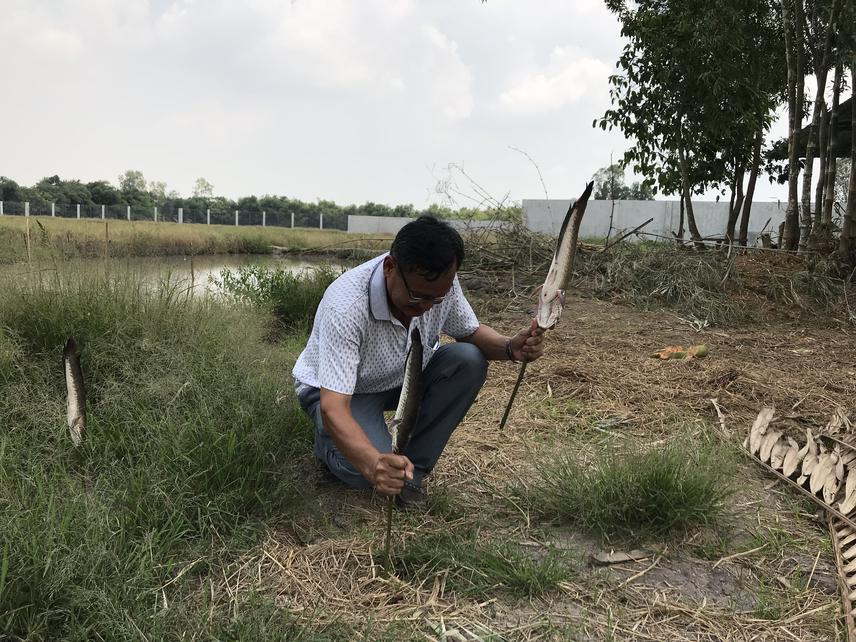Social media video featuring the project.
Conservation of Mekong Traditional Rice (Bao ton lua mua DBSCL)
25 Jun 2020 Vinh Hoa Phu, Vietnam, Asia Invertebrates | Communities | Farming | Plants
Long-Term Biophysical and Socio-Economic Monitoring of Floating Rice-Based and Intensive Rice Farming Systems in Mekong Delta
This project aims to scale up the conservation and development of traditional rice-shrimp based agro-ecological farming system for agrobiodiversity, nutrition and health of households and communities in the Mekong Delta, Vietnam. The project has four work packages (WPs). WP1 investigates socio-economic, biophysical conditions, agrobiodiversity, nutritional status and health of individuals and households undertaking the traditional-rice shrimp farming system in Chau Thanh District of Kien Giang province. WP2 promotes value-added chemical free traditional rice in the local and international market. WP3 is dissimilating research outcomes to stakeholders (government, business

Mr Le Quoc Viet, caught a snake head fish (a very common fish in the paddy fields, a very famous fish for daily food of Mekong people) - the fish is cooked by traditional rice straw after threshing. Farmers stores rice straw for fuel and cooking.
Traditional chemical free rice based agroecological farming systems were introduced in the Mekong Delta since 1705 (Biggs 2012). This system adapted to natural environment which supported diversity of foods (rice, aquatic animals, and vegetables) to million people in the Mekong Region. Since high yielding variety (HYV) rice was introduced in 1968, it quickly dominated, degraded local environment by overusing chemical fertilizer and pesticides (Nguyen et al. 2018; Berg et al. 2017; Berg 2002) caused water pollution and negative impacts on human health (Phuong and Gopalakrishnan 2013), and disrupted local nutritional food system (Nguyen et al. 2018).
The Vietnam Government issued the Resolution 120/NQ-CP on 17th November 2017 on sustainable and climate resilient development of the Mekong Delta. By 2050, The proportion of ecological agriculture and high-quality agriculture will reach 80%. The resolution focuses on shifting the way of thinking in agricultural development from mainly rice cultivation to from quantity to quality and from chemical based agricultural production to organic and hi-tech practices (The Government of Vietnam 2017).
This project will be implemented at Vinh Hoa Phu Commune of Chau Thanh District of Kien Giang province. The commune is rich in agro-biodiversity located between the Cai Lon and Cai Be River where fresh and brackish water interfaced. In the wet season from May to December, farmers cultivate a single traditional, long term (5- months) rice (lúa mùa) crop, integrated with freshwater prawn (Macrobrachium rosenbergii), rotated by saltwater shrimp in the dry season. Several nutritious chemical free traditional rice varieties are cultivated including: Tàu Hương, Trắng Tép, Móng Chim, Một Bụi, Ba Bụi which were perceived as most tasty and nutritious. These varieties are under endangered because the HYV rice was mostly adopted by small scale farmers across the Mekong Delta.
The project will undertake seven research for development activities within 12 months, commencing in July 2020.
1. A participatory approach is used to map the linked agriculture-nutrition-health of 50 smallholder farmers and their family members.
2. Soil and water data collection and analysis to set up baseline indicators for measuring climate resilient farming system in the coastal deltas.
3. Baseline data on fish, reptile, amphibians, and fauna species will be collected using a participatory community-based approach.
4. Value-added chemical free traditional rice products are tested to promote local and international market. Nutritional rice flour and rice cracker/cakes will be processed and promoted at HCM city market and foreign market.
5. Three endangered traditional rice species will be purified on the fields, pre-selected and reserved. The best tasty rice and climate resilient varieties will be tested.
6. Two stakeholder workshops will be hosted in the district to advocate government policies to promote climate resilient farming systems to secure nutritional food for rural communities.
7. Three papers will be submitted to peered review journal to share scientific knowledge with global and Asian deltas.
Social media video featuring the project.
Conservation of Mekong Traditional Rice (Bao ton lua mua DBSCL)